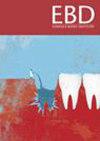Child temperament and early childhood caries: is there a link?
Q3 Dentistry
引用次数: 0
Abstract
A systematic search was conducted across multiple databases (MEDLINE via PubMed, EMBASE, Scopus, LILACS, Web of Science, and EBSCO) up to January 2023. Any case-control, cohort, or cross-sectional study which assessed child temperament and early childhood caries (ECC) in children aged six years or younger were included. Literature reviews, studies with insufficient data, non-English publications, and those focusing on older children or adults were excluded. Data extraction was conducted independently by two authors, with a third author resolving any disagreements. Risk of bias was assessed using the Newcastle-Ottawa assessment scale (case-control and cohort studies) and the Appraisal tool for Cross-Sectional Studies (cross-sectional studies). The quality of evidence was evaluated using the Grading of Recommendations, Assessment, Development, and Evaluations (GRADE) approach. Statistical analysis to evaluate heterogeneity included the chi-square test and the I-square index. A total 5072 studies resulted in the inclusion of 15 studies, encompassing data from 6,667 participants. Seven studies were of high quality and eight, moderate. Meta-analyses of seven studies revealed a significant association between certain temperament traits (e.g., higher levels of emotionality and lower levels of sociability) and ECC. In particular, difficult temperament was associated with ECC (OR 2.63 95%CI: 1.37–5.04) The study concluded that child temperament is a significant factor in the risk of developing ECC. Specifically, children with higher emotionality and lower sociability are at greater risk. Interventions targeting child temperament through child behaviour and parental management strategies may be effective in reducing ECC.儿童气质与幼儿龋齿:两者之间有联系吗?
数据来源:对多个数据库(MEDLINE via PubMed、EMBASE、Scopus、LILACS、Web of Science 和 EBSCO)进行了系统检索,检索期截至 2023 年 1 月:研究选择:纳入任何对六岁或六岁以下儿童的气质和儿童早期龋齿(ECC)进行评估的病例对照、队列或横断面研究。文献综述、数据不充分的研究、非英语出版物以及以年长儿童或成人为研究对象的研究均被排除在外:数据提取由两位作者独立完成,第三位作者负责解决任何分歧。使用纽卡斯尔-渥太华评估量表(病例对照和队列研究)和横断面研究评估工具(横断面研究)评估偏倚风险。证据质量采用建议、评估、发展和评价分级法(GRADE)进行评估。评估异质性的统计分析包括卡方检验和 I 方指数:结果:总共有 5072 项研究,最终纳入了 15 项研究,涵盖了 6667 名参与者的数据。其中 7 项研究质量较高,8 项研究质量中等。对七项研究进行的元分析表明,某些气质特征(如较高的情绪化水平和较低的交际能力)与幼儿注意力缺失有显著关联。特别是,困难气质与幼儿保育相关(OR 2.63 95%CI:1.37-5.04):研究得出结论,儿童的脾气是影响幼儿保育的一个重要因素。具体而言,情绪化程度较高和社交能力较差的儿童风险更大。通过儿童行为和家长管理策略对儿童气质进行干预,可能会有效降低幼儿保育的风险。
本文章由计算机程序翻译,如有差异,请以英文原文为准。
求助全文
约1分钟内获得全文
求助全文
来源期刊

Evidence-based dentistry
Dentistry-Dentistry (all)
CiteScore
2.50
自引率
0.00%
发文量
77
期刊介绍:
Evidence-Based Dentistry delivers the best available evidence on the latest developments in oral health. We evaluate the evidence and provide guidance concerning the value of the author''s conclusions. We keep dentistry up to date with new approaches, exploring a wide range of the latest developments through an accessible expert commentary. Original papers and relevant publications are condensed into digestible summaries, drawing attention to the current methods and findings. We are a central resource for the most cutting edge and relevant issues concerning the evidence-based approach in dentistry today. Evidence-Based Dentistry is published by Springer Nature on behalf of the British Dental Association.
 求助内容:
求助内容: 应助结果提醒方式:
应助结果提醒方式:


